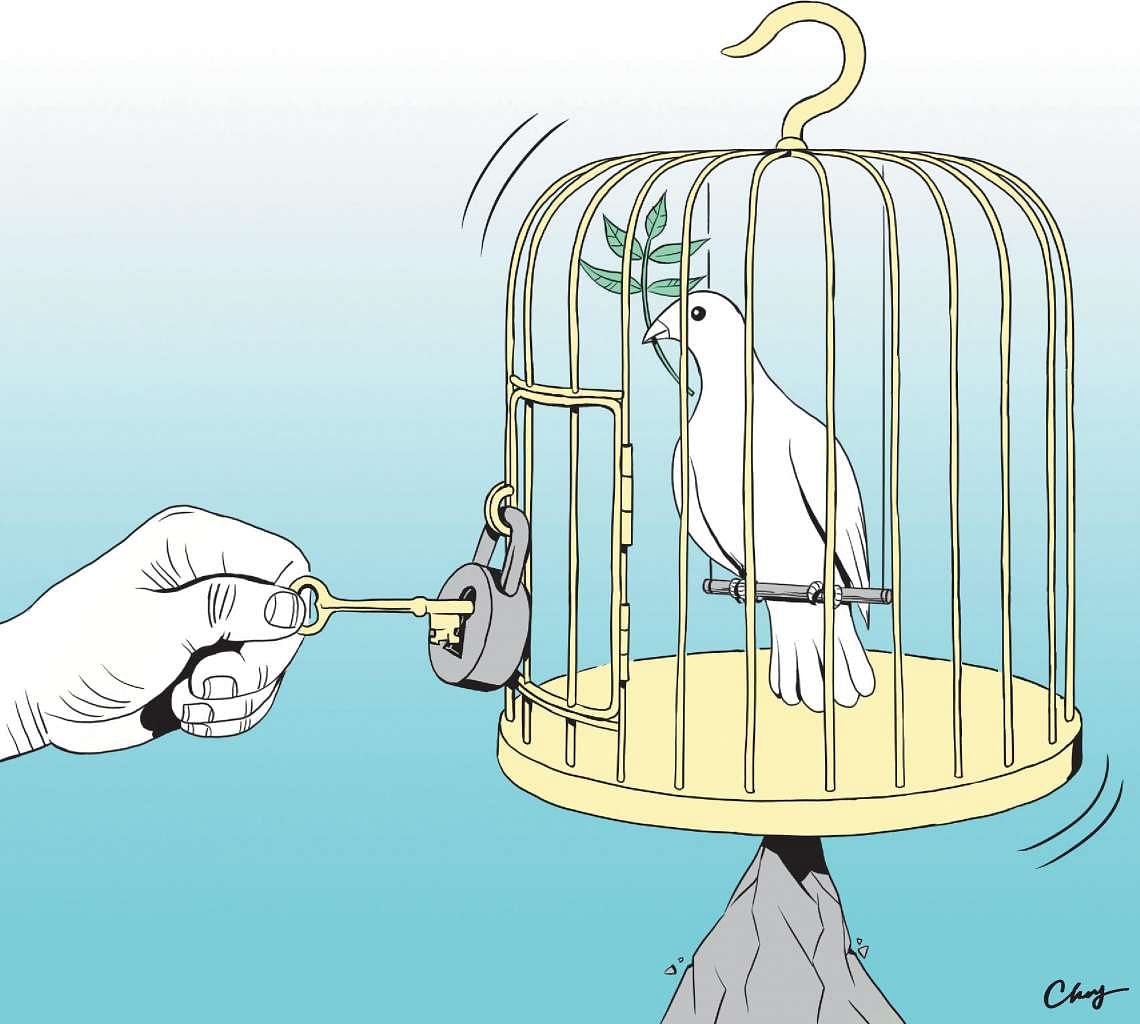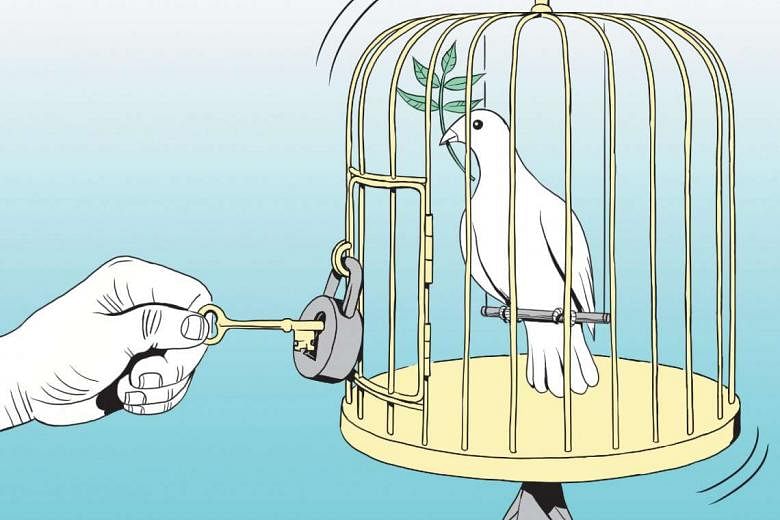LONDON • Two years ago, it took only several hundred ISIS fighters to seize Mosul, Iraq's second-largest city. Now, more than 35,000 soldiers equipped and trained by the United States and led by Iraq are needed to liberate the city from the clutches of the same terrorist organisation. The disparity between the forces is large, and the Islamic State in Iraq and Syria (ISIS) boasts about it in its "martyrdom" propaganda, by claiming that its ragtag fighters are capable of holding back organised armies.
Still, chances are high that ISIS will be evicted from Mosul, and that the city's estimated 1.5 million inhabitants will be able to regain a semblance of normality. Yet ultimate success will be judged not so much by how this confrontation ends, but more by the way Iraq and its neighbours conduct themselves after the fighting is over. For this is a key battle which can reshape the Middle East; it could be a turning point towards a more stable and optimistic region, but also a tipping point further into the abyss.
STRATEGIC SETBACK CONTAINED
The loss of Mosul in June 2014 heralded a much bigger strategic setback for the entire Western policy in the Middle East. The sight of two entire Iraqi army divisions fleeing without as much as a fight indicated the hollowness of the country's military structures.
The fact that many Mosul residents welcomed the ISIS fighters at that time was also seen as a broader rejection of Iraq's Shi'ite or Shi'ite-leaning politicians, despised by Mosul's largely Sunni Muslim population.
But ultimately, it was the fact that ISIS leader Abu Bakr al-Baghdadi used his occupation of the city in order to announce the establishment of his so-called "caliphate" which proved to be the biggest challenge for the stability of the Middle East. For it raised the spectre of a broader meltdown of existing Arab states throughout the Middle East. In short, it was a strategic disaster of monumental proportions.

The fact that this strategic setback was contained and is now about to be reversed is due to the same US administration everyone criticises in the Middle East. The Americans cajoled the Iraqi government into becoming more inclusive. US legislators bit their lips and authorised massive additional spending on new weapons and training for the same Iraqi military which back in 2014 abandoned all its US-made shiny toys in Mosul.
The US also coordinated special forces units from Britain, Canada, Australia and a handful of other countries which penetrated ISIS' defences in advance of the current offensive, providing essential intelligence material for the assault. And crucially, around 5,000 American troops are also part of the coalition force now advancing on Mosul.
But it was the behind-the-scenes diplomatic work which provided the critical glue to the operation. Iran and its Shi'ite proxy militias in Iraq were persuaded to keep a discreet distance in order not to give this offensive a sectarian dimension. Turkey was also told to remain on the sidelines. Given their discipline and professionalism, the Kurdish Peshmerga forces are included in the offensive, but the operation remains firmly under Iraqi government control.
Finally, the broader diplomatic stand-off between the US and Russia over policy in neighbouring Syria was not allowed to interfere with the timetable for the Mosul operation. Armchair strategists may argue that the US should have done all the above much sooner, but they cannot begrudge the reality that Washington ultimately defied all obstacles, prepared the current offensive meticulously and assembled a force with a great punch.
The snag is that all these achievements can unravel not only if the Mosul operation encounters unexpected difficulties but, ironically, also if the offensive produces a swift and decisive military success. For the challenge throughout the Middle East is not so much to win battles, but to win the subsequent peace. And that may remain as elusive as ever.
The most immediate task is to destroy ISIS while preventing a massacre inside the city, where terrorists now use civilians as human shields; the manner by which victory is achieved counts as much as victory itself. And that will not be easy, for fighting in built-up areas is just about the bloodiest of all military operations.
After the liberation of Mosul, the allied force will have to reassure the city's inhabitants as well as Sunnis elsewhere that Iraq's government is truly theirs, and that they would get a fairer deal from a Shi'ite-dominated Iraqi government in the capital of Baghdad than they did since Saddam Hussein was deposed by the US-led invasion more than a decade ago.
That is not as hopeless as it sounds. Last week, ISIS launched a surprise attack on Kirkuk, another major Iraqi city, largely in the hope of deflecting the allied pressure on Mosul. But the attack failed, mainly because Sunnis in that city refused to give the terrorists shelter as they would have done in the past, a welcome sign that ISIS may be beginning to lose its appeal with Sunnis.
Nevertheless, the real job of persuading the Sunnis that the Shi'ite-controlled Iraqi military is their protector still lies ahead. And although the Shi'ite militias which are Iran's proxies are being kept away from the battle, it is difficult to see Iran agreeing to remain relegated to the peripheries of Iraq's politics in the long run.
And it is equally difficult to see how Turkey can be kept out of the fighting. Turkey fears that Mosul's liberation with the support of the Kurds will merely serve as a prelude to the consolidation of a de facto independent Kurdish state in northern Iraq; it is now usually forgotten that Turkey has maintained forces around Mosul for the better part of two decades partly in order to prevent the Kurds from gaining the upper hand in the region, and partly in order to defend Turkmens, an ethnic group related to the Turks which is concentrated around Mosul.
Turkish President Recep Tayyip Erdogan has every reason to continue down this path: He recently declared that Turkey will not betray its "Turkmen kinsmen" or its "Sunni Arab brothers". Keeping Turkey out of the fray will not be easy, and especially after Mosul is liberated.
THE SYRIA QUESTION
But the biggest challenge will be how to transform the defeat of ISIS in Mosul into a broader rout for the terrorist organisation. The allied forces currently besieging Mosul have deliberately left a gap in their forward lines in order to allow ISIS fighters who do not wish to die a chance to flee the area. The concession is not as generous as it seems: The only way these ISIS fighters can retreat is towards the desert parts of the nearby Syrian border, an open space where terrorists can be easily spotted and hunted by US drones.
But if the longer-term objective is to prevent ISIS from regaining an operational base or from continuing to recruit among disaffected locals, then an answer must also be found to the war in Syria, and particularly to the plight of the Syrian city of Aleppo. For Aleppo and Mosul share the same history: both are Sunni-majority important trading hubs which enjoyed close ties and were separated only by a border arbitrarily drawn by British and French colonial powers almost exactly a century ago.
If Mosul is free but Aleppo continues to be pulverised by Russian aircraft with Western powers not lifting a finger to stop the carnage, ISIS or any successor organisation of a similar kind will continue to be able to portray itself as the Sunnis' defender, and attract supporters.
And then, there is the problem of the foreign fighters in ISIS' ranks, who are currently subjected to a Darwinian-style "survival of the fittest" test. Those who die in Mosul are either the unlucky or the unprofessional, while those who ultimately survive this siege will be battle-hardened professional killers. Many may choose to remain in the Middle East. But if only a handful of these people return to their countries of origin in Europe or elsewhere in the world, governments may be looking at many years of further terrorist trouble.
With determination and patience, all these problems can be addressed. But both are not qualities for which either the US or its allies are particularly famous in the Middle East.


